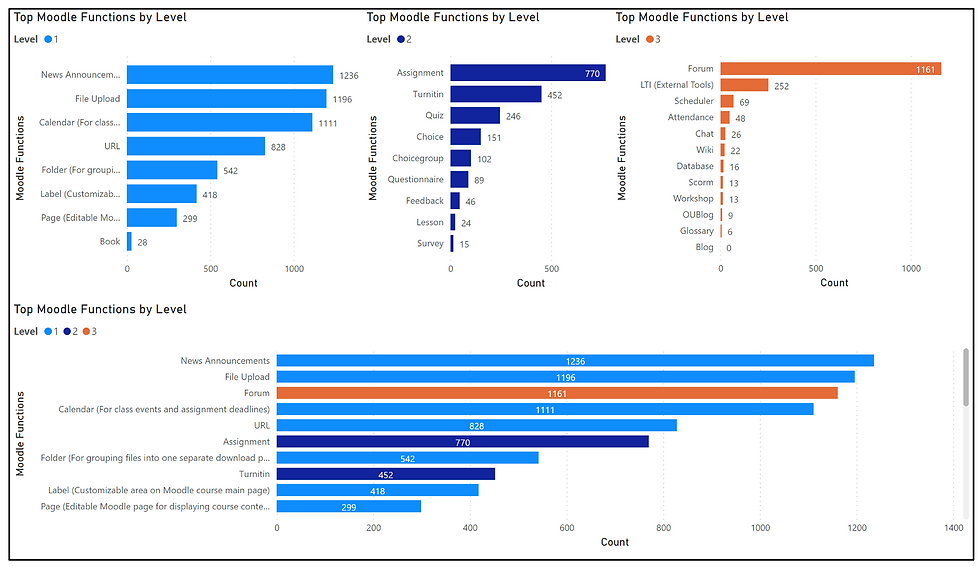
Learning Analytics and AI
Evaluation on HKU Moodle
Date
Team
2022
Sunny Kong, colleague at the Teaching & Learning (T&L) unit, and the Task Force on LMS Functionality at HKU
My Role
Researcher
Target Users / Audience
Professor Ian Holliday, Vice-President (Teaching and Learning) of HKU
Tools Used
Moodle
Overview
How can a good Learning Management System (LMS) support teaching and learning? We have conducted an evaluation on the Learning Management System (LMS) functionality in HKU Moodle and devised a baseline policy for teachers.
1. Moodle Usage Data
We have obtained data on Moodle functions and concluded the following:
Moodle Usage can be classified into three levels - 1. Content and Communications, 2. Assignment, and 3. Collaboration and Advanced Learner Support
Most student feedback focus on issues relating to the provision and the delivery of instructional materials. The HKU Moodle data indicates that 30% HKU courses in AY20-21 S2 did not use Moodle for these purposes.
Guides and workshops can be scenario-based instead of function-based to help teachers understand how Moodle can enhance their teaching efficiency. Yet, cultivating the habit of using Moodle may be difficult given the varied perceptions of Moodle’s positioning as a T&L tool.
More than half of the advanced Moodle functions are underused. This shows that Moodle may not be the most preferred tool in some context, e.g. Kahoot is preferred over Moodle Quiz.
In all, the first phase of the LMS usage policy should focus on the timely provision of the “bare minimum” instructional materials for students. The second phase should focus on the community aspect of Moodle as a think tank for intellectual discussion.

2. Interviews
We then conducted semi-structured interviews with current teachers and students to understand their experience and opinions on Moodle.


Process
Final Deliverable(s)
We have produced a 3000-word evaluation report, proposing a set of baseline requirements that are intended to be a helpful and comprehensive guide for staff to best structure and design online learning resources and activities in Moodle.
Moodle usage can be classified into three levels - 1. Content and Communications, 2. Assignment, and 3. Collaboration and Advanced Learner Support. Recommendations for the three levels are summarized as follows:

1. Content and Communications
To create a positive learning experience on Moodle, teachers should provide instructional materials in a timely manner. In addition, a clear and visually appealing layout, i.e., use of topic labels and banners, will aid students to navigate and locate content more efficiently. Furthermore, teachers may explore various functions in Moodle to present their lecture content. Aside from PowerPoint, they may consider using the Book or Page function on Moodle for an integrated experience.
2. Assessment
Assessment requirements should be detailed on Moodle. Where applicable, written assessments should be collected via the Assignment or Turnitin function on Moodle. Teachers are encouraged to explore different assessments and feedback collection tools, such as Quiz and Survey.
3. Collaboration and Advanced Learner Support
Teachers are encouraged to adopt Forums to facilitate asynchronous discussion activities among students. They may also consider using a range of e-learning tools alongside Moodle to create a seamless and engaging learning experience for students.